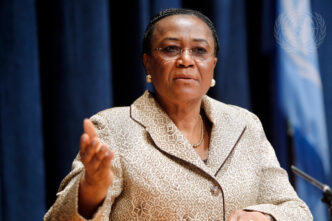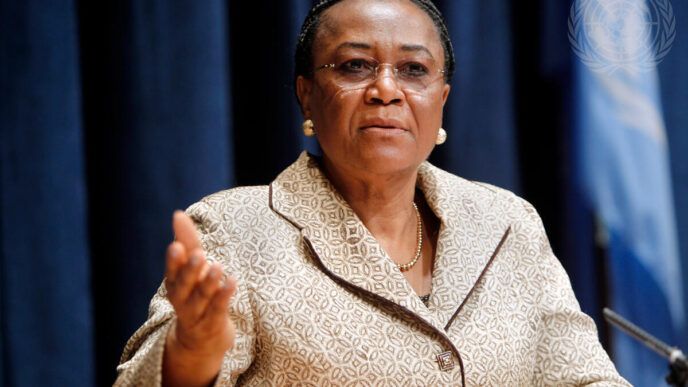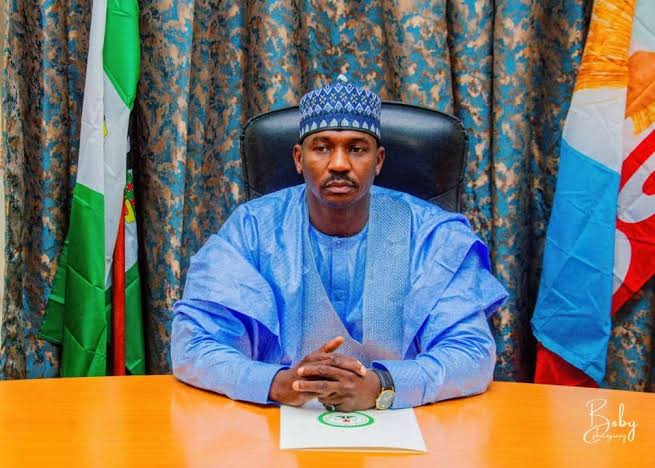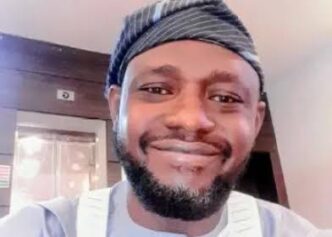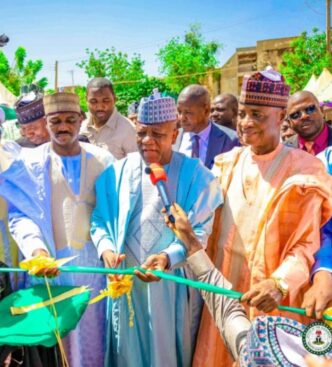The former Minister of Innovation, Science and Technology, Chief Geoffrey Uche Nnaji who recently resigned his position as Minister over allegations of certificate forgery should not be wished well in his future endeavor as contained in the letter accepting his resignation issued by the Spokesperson to the President, Mr. Bayo Ononuga. Rather he should be handed over to the police for investigation and prosecution if found culpable.
Nnaji who claimed to have graduated from the University of Nigeria Nsukka in 1985 and also claimed to have served the mandatory National Youth Service Corp program in April of 1985 to 1986 documents he used to contest for the All Progressive Congress (APC) Governorship election in 2023 in Enugu State which documents he also presented from screening as Ministerial Nominee in August 2023 was recently bursted by an online newspaper Premium Times.
A cursory report of the event as relayed by the newspaper reveals that whereas the degree certificate Mr. Nnaji is parading is dated July 1985, his NYSC certificate indicates that he served from April 16, 1985, to May 15, 1986 three clear months before his purported graduation.
Records made available by the University showed that On July 30, 1985, the Registrar’s Department (Examinations) wrote to student Geoffrey Nnaji with the under mentioned subject matter, “June/July, 1985 Degree/Diploma/Professional Examinations Results” which letter reads; “The results of the June/July, 1985 Degree/Diploma/Professional Examinations show that you have been referred in the following paper(s)/course(s): Paper/Course No, MCB 431AB; Paper/Course Title, Virology.
“The University Examinations Regulations permit you to sit the Supplementary examinations in the above paper(s)/course(s). Supplementary examinations are to begin on September 12, 1985.”
Again on November 8, 1985, the Registrar’s Department (Examinations) wrote another letter to Student Geoffrey Nnaji on the subject matter of “1984/85 September Supplementary Examinations Results.” to wit;
“I regret to inform you that the results of the 1984/85 September Supplementary examinations result show that you have not made the required grade in the 1985 September Supplementary examinations in the following course(s)/paper(s): MCB 431, Virology.
“If you wish to take the June 1986 examinations as is provided in the University of Nigeria Academic Regulations, you are required to notify the Registrar through your Head of Department with a proof of payment of an examination fee of N4.00 (Four naira).”
It was not shown anywhere that student Geoffrey Nnaji ever wrote that course(s)/paper(s): MCB 431, Virology to qualify him for graduation.
However, in a twist reminiscent of fraudulent notoriety, the former Minister claimed to have started his National Youth Service in April 1985 and presented a discharge certificate with number A231309. However
an extensive review of NYSC certificates, from inception to at least October 1990, revealed that the six-digit numberings are devoid of alphabetic characters as prefix. Further comparison of the certificate issued to Lateef Fagbemi, the current Minister of Justice and Attorney General of the Federation, in 1986, is numbered 323213. That of Abubakar Badaru (the incumbent Minister of Defence) issued in 1986 is numbered 299355.
Apart from these forensic scrutiny of the certificate paraded by Mr. Nnaji, NYSC in its reply to Premium Times’ enquiry on September 23, 2023, stated categorically that it had no record of the certificate in the minister’s possession and was therefore unable to authenticate it.
Also the head of the NYSC at the time the former Minister claimed to have undergone the national service was Col. Edet Akpan, who held sway between January 1984 and December 1987, the minister’s supposed NYSC discharge certificate bears the signature of Col. Animashaun Braimoh, who was the fifth head of the NYSC between January 1988 and December 1990.
The designation of NYSC’s heads at the time he claimed to have served and till the early 1990s was known as “Director,” the headship became known as “National Director” in the later years in the 1990s and ultimately as “Director General”, a designation that subsists till date. Surprisingly, the minister’s discharge certificate was signed by a “National Director” in 1986. That was several years before the introduction of that designation.
FORGERY UNDER NIGERIAN LAW.
MEANING AND SCOPE.
Forgery is the false making or alteration of a document with intent that it be used or acted upon as genuine, to the prejudice of another. It is a serious offence recognised under both the Criminal Code (applicable in the Southern states) and the Penal Code (applicable in the Northern states).
Forgery typically involves three central acts:
Making a false document or writing;
Knowledge that it is false; and
Intention that it should be accepted as genuine to another’s detriment.
These three elements are present in relation to the former Minister’s case. ie, it is obvious from investigation that those certificates were false and they were made knowing them to be false and with the intention that they be acted upon and have indeed be acted upon to the benefit of the former Minister and the detriment of the society.
STATUTORY PROVISIONS DEFINING FORGERY
(a) Under the Criminal Code
Section 465 of the Criminal Code Act defines forgery as:
“A person who makes a false document or writing knowing it to be false, and with intent that it may, in any way, be used or acted upon as genuine, whether in Nigeria or elsewhere, to the prejudice of any person, or with intent that any person may, in the belief that it is genuine, be induced to do or refrain from doing any act, commits forgery.”
Section 467 prescribes punishment for forgery, varying from three years to life imprisonment, depending on the nature of the forged document (e.g., public seal, banknote, title deed, or other valuable security).
Section 468 further punishes uttering a forged document — that is, presenting it as genuine.
(b) Under the Penal Code (Northern States)
Section 362 defines making a false document.
Section 363 provides that whoever makes any false document or part of a document, intending that it be used as genuine, commits forgery.
Section 364 prescribes punishment — imprisonment up to fourteen years, with possible fine or both, depending on the gravity and nature of the document. Section 366 extends liability to persons who possess or use forged documents knowing them to be forged.
These sections are substantially similar to those in the Criminal Code, differing mainly in terminology and classification.
INGREDIENTS THE PROSECUTION MUST PROVE.
From judicial interpretation, four key elements must be established beyond reasonable doubt:
That a document or writing exists and is false;
That the accused made or participated in making it;
That the accused knew it was false; and
That the accused intended it to be used or acted upon as genuine to another’s detriment.
As highlighted above the former Minister knew that the certificates he presented were false and he made them knowing them to be false and with the intention that they be acted upon and have indeed be acted upon to the benefit of the former Minister and the detriment of the society. In Odiawa v. Federal Republic of Nigeria (2008) LPELR-4230 (CA)
The Court of Appeal held that to secure a conviction for forgery, the prosecution must prove that:
There exists a false document;
The accused made or was a party to the making of it;
The accused knew the document to be false; and
The intention was that it be used as genuine.
The court emphasised that mere possession of a false document is not sufficient unless the requisite intention is established.
Alake v. The State (1991) 7 NWLR (Pt.205) 567
The Supreme Court reaffirmed that the intention to defraud or deceive is the crux of the offence. It ruled that where the accused knowingly altered a certificate to obtain an advantage, the offence of forgery is complete even if the forged document was not ultimately used and in this case the Minister has used it to contest for a Governorship election and also use it to secure a ministerial position.
In APC v. PDP & Ors (2015) LPELR-24587 (SC)
The Supreme Court clarified the evidential rule in proving forgery, holding that:
“The best evidence of a forged document is the production of the genuine original and the alleged forged copy for comparison.”
However, the Court noted that where the original is not available, circumstantial or expert evidence may suffice if the totality of evidence establishes falsification.
In Duru v. Federal Republic of Nigeria (2016) LPELR-40447 (CA)
The Court of Appeal upheld the conviction of the appellant who used forged company documents to obtain funds. The Court held that the prosecution successfully proved that the document was false and that the accused used it knowing it to be false satisfying the statutory elements of forgery.
PROSECUTORIAL AUTHORITIES AND POWERS.
While the is empowered to investigate the offense, The Office of the Attorney General of a State and the Nigeria Police are statutory empowered to prosecute forgery offences under the Criminal and Penal Codes before State High Courts.
THE ROLE OF ECONOMIC AND FINANCIAL CRIMES COMMISSION (EFCC).
Although the EFCC (Establishment) Act, 2004 does not itself create the offence of forgery, it vests the Commission with power to investigate and prosecute forgery when connected with financial or economic crimes.
Relevant Sections of the EFCC Act:
Section 6(b) – empowers the Commission to investigate all financial crimes including forgery, fraud, counterfeiting, and similar offences.
Section 6(h–j) – authorises EFCC to coordinate and enforce all laws relating to economic and financial crimes.
Section 7(1)(b) – permits investigation of any person suspected of offences under this Act or any other law relating to economic and financial crimes.
Section 13(2) – establishes the Legal and Prosecution Unit responsible for prosecuting offences investigated by the Commission.
In FRN v. Fani-Kayode (2010) 14 NWLR (Pt.1214) 481 (CA), the Court of Appeal affirmed that EFCC has the statutory power to prosecute forgery when it is linked to financial crimes, relying on Sections 6(b) and 7(1) of the EFCC Act.
COMPARATIVE JUDICIAL APPROACH ACROSS JURISDICTIONS:
Southern States (Criminal Code) – Courts emphasise documentary and expert evidence (e.g., Duru v. FRN in Lagos).
Northern States (Penal Code) – Courts interpret forgery under Sections 362–366; e.g., in FRN v. Mustapha Umar Madawaki, the FCT High Court applied these sections to convict a public officer who forged official documents.
Both jurisdictions maintain that knowledge of falsity and intent to deceive are indispensable ingredients.
CONCLUSIONS:
Forgery remains a grave offence under Nigerian criminal jurisprudence. Whether prosecuted by the Police, the Attorney General or the EFCC, the law requires proof of a false document, the accused’s knowledge of its falsity, and intent that it be accepted as genuine.
While the Criminal Code and Penal Code provide the substantive definitions and penalties (Sections 465–468 and 362–366 respectively), the EFCC Act — through Sections 6(b), 7(1)(b) and 13(2) — extends investigative and prosecutorial reach over forgery connected to financial crimes.
The courts, through decisions such as Odiawa v. FRN, Alake v. State, and APC v. PDP, have firmly entrenched these principles, ensuring that the offence of forgery continues to be punished as an instrument of fraud and deception in both public and private dealings.
Consequently, it is imperative upon the police to commence immediate investigation of the allegations of forgery levied against Mr. Nnaji and if prima facie evidence is established against him, the Attorney General of Enugu State should commence prosecution immediately to serve as a deterrent to would be forgers that there are consequences for every action in Nigeria.
Dr. Liborous Oshoma is a Legal Practitioner in Lagos.



